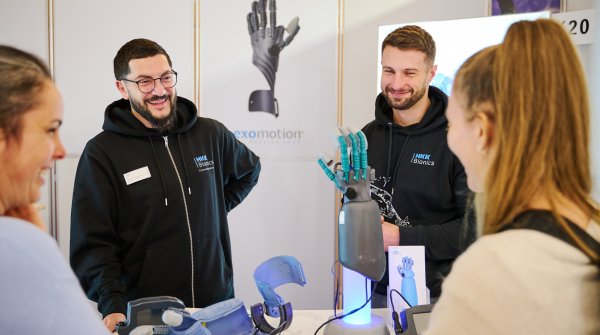"AI is well on its way to becoming a real game changer for online retail,"
says Rico Adler, Director Solution Consulting at Scayle, a provider of store software whose commerce platform is used by major international online retailers such as About You, Harrods, Deichmann, Odlo, Manchester United and FC Bayern for their digital business. Adler specializes in innovative technologies to improve scalability, customer experience and process automation and advises numerous companies on the implementation of their AI strategy.
Here, he explains which options make sense for sports retailers and which pitfalls need to be considered. Because one thing is clear: the areas of application are diverse. From personalized recommendations and automated customer service to dynamic pricing. However, not every innovation automatically generates trust among customers - and not every solution is suitable for every business model. You should take a closer look at these eight AI applications:
Anyone who sells running shoes, rackets or bike helmets online knows the problem: customers often abandon a purchase because they don't feel they have received good advice. The traditional filters and recommendation engines used to date often don't help. AI-based recommendation systems, on the other hand, recognize users' behavioural patterns and interests in real time and suggest suitable products based on this. Adler explains:
'They can identify correlations in terms of user* behavior and purchase intention at much more granular levels, thereby increasing the conversion rate. AI has the potential to completely eclipse the methods used to date for product recommendations.
For example, customers who have recently been looking for running shoes will receive a personalized recommendation for new running shoes - for example, with special comfort for long-distance running, plus functional clothing in the right size and a new electrolyte drink. The system suggests products that have been added to the shopping cart by other customers with similar purchasing behavior and also takes customer reviews into account.
Risk: Overly intrusive or irrelevant suggestions can diminish trust - especially if users feel they are being "spied on"

Modern chatbots and voice assistants have long been able to answer standard questions, manage orders or initiate returns. Thanks to AI-based advances in natural language processing (NLP), they can now also recognize the intention behind a service request and respond not just on the basis of keywords. This means that even complex questions can be answered quickly and reliably and even natural, context-based conversations can be held. But there is more: Mith voice commerce. Adler explains:
'This is one of those areas that hasn't developed substantially for a long time and therefore hasn't really made it into the made it into the mainstream. But that is also changing with AI.
Customers will not only be able to search for products, add them to their shopping cart and buy them using voice commands, as is already standard with Amazon's "Alexa". Voice agents will increasingly be given their own identity and have the appearance of a natural person. Adler adds:
'Currently, however, the challenge is to get the new smart assistants out of the habit of 'hallucinating', i.e. simply making something up themselves if the query is too imprecise.
Risk: If the technology fails, for example with complex queries, the efficiency gained for the store quickly turns into frustration for shoppers. A hybrid strategy that combines AI and human support significantly improves customer satisfaction. Escalation to real service employees should therefore remain guaranteed.
Manage stock more efficiently, avoid overproduction and still always have enough goods in stock? With machine learning, reinforcement learning or predictive analytics, retailers can make great progress here. Adler shows:
This is because AI not only supports the analysis of trends, sales and seasonal data, but also provides precise forecasts for proactive decisions.
AI also helps to optimize supply chains - from logistics processes and delivery times to risk management. For example, predictive analytics can be used to forecast when which sporting goods - such as ski helmets during the winter season or sunglasses during the summer season - will be in greater demand in a particular region. Stock levels can then be proactively adjusted and delivery to this region prioritized. This enables better stock planning, reduces costs and improves availability. The evaluation of customer ratings and returns behaviour can also be taken into account and influence purchasing and inventory optimization.
Risk: AI optimizes product ranges based on sales figures. This also leads to bestsellers being prioritized, while niche products receive less visibility. This results in monotonous product ranges, which can reduce the attractiveness of a store in the long term. Adler emphasizes:
Retailers should specifically manage AI to ensure a balance between bestsellers and niche products. Curated content and personalized recommendations help to maintain diversity and surprise customers with new products. Conscious countermeasures through human curation and the promotion of long-tail products are crucial.

The price war in sports retail reduces margins and damages the brand image and credibility in the long term. Adler therefore relies on brand optimization using dynamic price management with AI-supported price algorithms.
This allows factors such as demand, competitor prices, seasonality and stock levels to be analyzed in real time.
Prices are adjusted flexibly and strategically in order to maximize sales and margins - and remain competitive at the same time. Adler adds:
'The idea is not fundamentally new and has been used in dynamic pricing with machine learning for years. What is new is the speed, accuracy and depth of data.
Thanks to AI-controlled price adjustments in real time, the online price of bicycle accessories, for example, can react flexibly to demand, stock levels and competition. This protects margins, especially during seasonal peaks. AI can also be used to tailor offers even more precisely to customers.
Risk: Frequent price changes can create mistrust among customers and damage the brand image in the long term. In addition, AI can screen competitors through data analysis of prices, discounts, bestsellers and customer behavior and thus spark targeted price wars through dynamic price adjustments that put everyone under pressure. Adler warns:
Instead of engaging exclusively in price competition, retailers should focus on customer loyalty, personalization and high-quality products. Consumers are willing to pay more for added value and trust. It is therefore important to find a balance between competitive prices and sustainable profitability.
An interesting option, especially for smaller sports retailers with a changing range or an interest in newcomers: instead of large pre-orders, AI helps to initially order only small quantities based on estimated demand. If the market reacts positively, additional orders are placed automatically - this reduces the risk of stock-outs and returns. The success stories of Temu and Shein are also based on this principle. However, this model requires not only reliable data, but above all fast production cycles and a flexible supply chain. The sports industry is still in its infancy in various categories.
Risk: Only works with reliable data and flexible production. Insufficient or inaccurate forecasts can lead to incorrect orders, resulting in either stock shortages or surpluses that jeopardize profitability.
Instead of reading thousands of reviews individually, AI recognizes weak points in products or service automatically. Adler emphasizes:
AI tools analyze ratings, reviews and social media comments and provide targeted suggestions for improvement.
This allows retailers to react much earlier, for example if a certain hiking boot is often rated as too tight or the size is different to what customers are used to. This also benefits customers and the returns rate, for example if retailers point out during the purchasing process that many customers have rated a shoe as "too small" and therefore recommend buying a larger size.
Risk: Beware of AI-generated fake reviews. Although these can positively influence purchasing decisions, they damage trust in e-commerce in general. Adler recommends:
Retailers should rely on intelligent checking mechanisms that recognize suspicious patterns in reviews.
Generative AI can use customer data to create content for personalized newsletters, social media posts or advertisements - tailored to the target group, season or product type. It can carry out A/B tests and identify the best strategy to address target groups efficiently and reduce wastage. For example, campaigns for sustainable sports fashion can be played out precisely and automatically. At the same time, discounts can also be offered in a targeted manner - tailored to the price sensitivity of customers or the respective margin.
Smaller stores in particular can benefit from this. Adler makes this clear:
AI offers new opportunities for smaller companies in particular: many processes that were previously only economically feasible for large corporations - such as personalized customer approach, automated analyses or intelligent warehouse management - are increasingly democratized by AI. With lower barriers to entry and open technologies, smaller players can also benefit from the power of modern AI.
Risk: Over-automation can also appear boring and arbitrary. Authenticity is an important success factor in sports retail in particular and should be taken into account in marketing.

AI can help to create content such as product descriptions, advertising texts, videos or social media posts not only more efficiently, but also to ensure greater consistency and quality, especially with large amounts of data. With the help of technologies such as computer vision and generative AI, it is already possible to create animated product videos, show products from different perspectives, highlight functions or simulate application scenarios. This automated video production enables companies to increase the conversion rate, as videos can support the purchase decision and increase customer loyalty.
At the same time, the high costs of traditional video productions are drastically reduced, which is a decisive advantage, especially for smaller retailers or retailers with extensive product catalogs.
Another bonus: AI not only saves time and money, but also ensures that content is optimized for search engines.
Risk: When it comes to content, not only creativity and emotionality are important, but also credibility. AI tools cannot yet reliably offer all of this. Hybrid concepts are a good solution here too.
One last important point remains: data protection. AI processes large amounts of customer data, because only then can it really make the most of its advantages. However, this increases the risk of violating data protection laws. Adler advises:
It is important to be aware of the tools used and the underlying foundation models. Sensitive data should not be carelessly transferred to AI systems whose data processing and model behavior are difficult to control.
He therefore recommends open source models whose hosting and access are completely in your own hands. And what about hacker attacks? The expert says:
Of course, hackers can also manipulate AI systems to gain access to sensitive data, but AI can also be used to detect and fend off cyber attacks at an early stage.
At ISPO 2025, you can find out how AI can be integrated into existing corporate strategies, what opportunities it opens up and what needs to be considered. As the international flagship event of the global sports industry, ISPO offers a platform for practice-oriented discussions with industry experts. Here you will gain valuable insights into technical innovations that will strengthen your company. Whether in the Digitize & Retail Hub or the Brandnew Village - this is where innovators, start-ups and established brands come together to drive forward pioneering ideas. Be there - from 30. NOV. - 02. DEC. in Munich.
Personalized product recommendations - increasing the conversion rate through more precise recommendations. Risk: overly intrusive suggestions could diminish trust.
Automated customer service - 24/7 support through AI-supported chatbots and voice commerce. Risk: Complex inquiries could lead to frustration.
Optimized supply chains and inventories - Better planning through AI-based forecasts. Risk: Bestsellers could displace niche products.
Dynamic price management - Real-time price optimization for competitive offers. Risk: Frequent price changes could create mistrust.
Reverse manufacturing - demand-driven orders minimize returns and stock-outs. Risk: Dependent on reliable data and flexible production.
Better understanding of customer feedback - Automatic analysis of reviews to optimize products and services. Risk: Fake reviews could jeopardize trust.
Targeting marketing campaigns precisely - Personalized content and offers. Risk: Over-automation could compromise authenticity.
Content creation - Efficient creation of product descriptions and advertising copy. Risk: AI cannot always deliver creativity and credibility.
 Sports BusinessSustainable ideas for store design
Sports BusinessSustainable ideas for store design Sports BusinessSports retail in transition: the future playbook for 2025
Sports BusinessSports retail in transition: the future playbook for 2025
- ISPO awards
- Mountain sports
- Bike
- Design
- Retail
- Fitness
- Health
- ISPO Job Market
- ISPO Munich
- ISPO Shanghai
- Running
- Brands
- Sustainability
- Olympia
- OutDoor
- Promotion
- Sports Business
- ISPO Textrends
- Triathlon
- Water sports
- Winter sports
- eSports
- SportsTech
- OutDoor by ISPO
- Heroes
- Transformation
- Sport Fashion
- Urban Culture
- Challenges of a CEO
- Trade fairs
- Sports
- Find the Balance
- Product reviews
- Newsletter Exclusive Area
- Magazine







